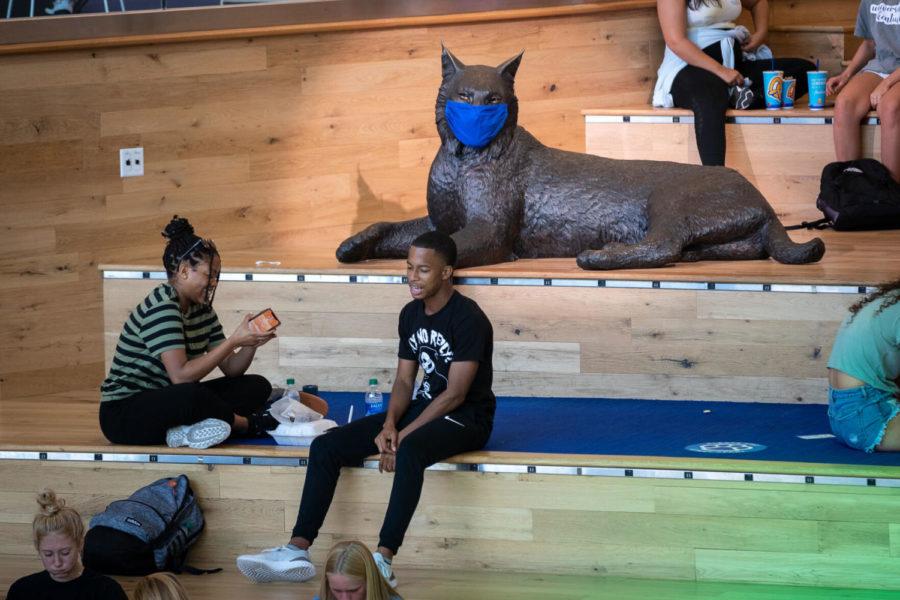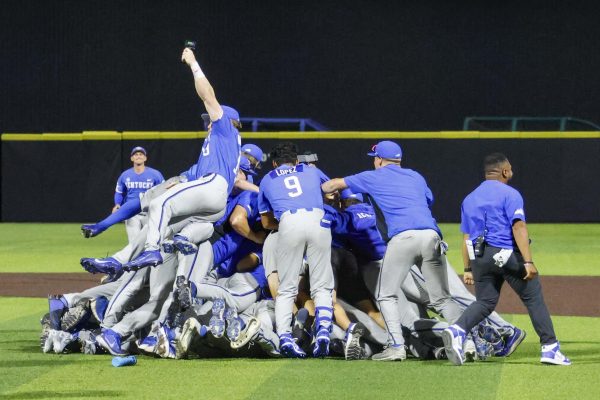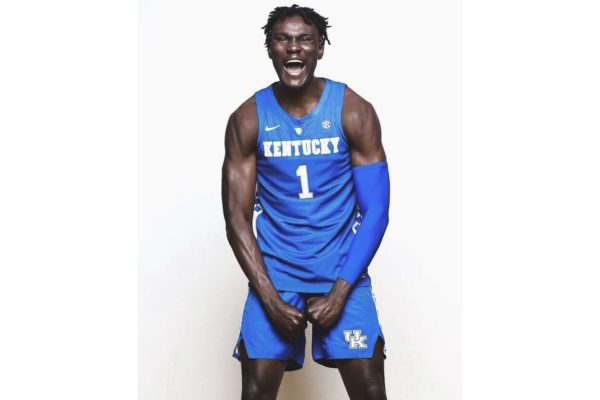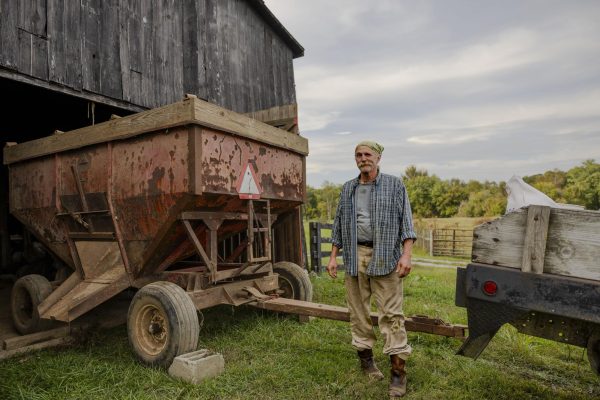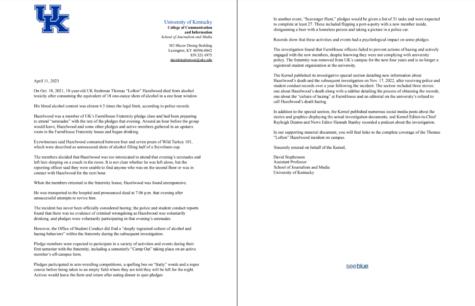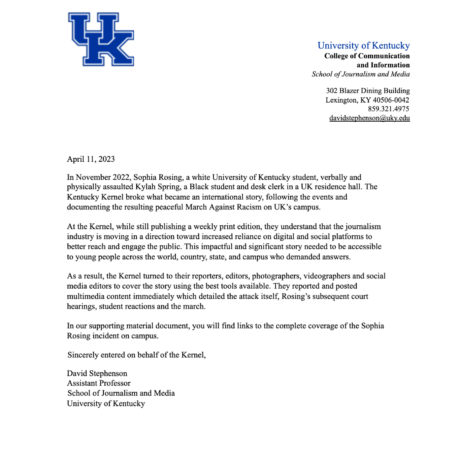UK students voice reactions to Pfizer COVID-19 vaccine
Students sit in front of a masked wildcat statue on the Social Staircase in the Gatton Student Center during the first day of classes for the fall 2020 semester on Monday, Aug. 17, 2020, at the University of Kentucky in Lexington, Kentucky. Photo by Michael Clubb | Staff
November 13, 2020
Pfizer announced last Monday their COVID-19 vaccine trials proved their vaccine was more than 90% effective. Pfizer is in the process of producing the vaccine so they can begin distributing it as soon as the FDA gives them the green light.
George Cranwell, a senior integrated strategic communications major, experienced relief when he heard the Pfizer vaccine trials went well.
“I was excited. It was relieving to hear some good news for once,” Cranwell said.
Bryce Huff, a sophomore biology major, hopes this vaccine will end COVID-19.
“The news about Pfizer’s vaccine is amazing for obvious reasons, and I really hope it’s the one to get us back to normal. In terms of the vaccine stopping the spread of COVID-19, if the vaccine does what vaccines are supposed to do then this should be the beginning of the end for COVID-19,” Huff said.
Prateek Katta, a senior studying business administration and pre-med, credits the scientific community’s ability to empower each other during the pandemic with the success of the vaccine trials.
“This news means that medicine and technology are heavily advancing to better the future of all of our citizens. Though there was a lot of emotional and financial turmoil at first, we have come a long way by working together. I feel that by everyone working together, both in and out of the scientific community, the creation of the vaccine was successfully expedited and will soon be open for the public. This is a true testament to how when faced with catastrophe, people can empower each other and bring out the best in one another,” Katta said.
If Pfizer receives authorization from the FDA, the company predicts it could vaccinate millions before the end of 2020. While UK students demonstrated a consensus of excitement surrounding the vaccine news, several believe it won’t be available by the end of the year like Pfizer predicts.
“Realistically, no I don’t think it will be available by the end of the year. In my mind, if they finish and create a feasible vaccine that passed all the research and trials, the CDC requires for widespread distribution by the end of 2020 I think that would be on pace. To mass-produce and distribute the vaccine is a whole different story but President Trump said they will use the military to mobilize the vaccine, and I’m sure President-elect Biden will do the same,” Huff said.
Cranwell agrees and believes the vaccine news is being used to ease people’s minds before the holidays.
“No, I doubt it. I think with it being so close to the holidays, they are trying to put people at ease from everything going on COVID-wise, which isn’t a bad thing. But I will believe when I see it, and we have to remember that two doses are required to be vaccinated according to Pfizer,” Cranwell said.
Kaila Friend, a senior sociology major doesn’t believe it will be available until 2021 because we are too late into the year.
“I doubt it, it’s November,” Friend said.
Josh Ford, a senior journalism major believes it will be available, but not for everyone.
“I think it will be available but I don’t think it will be available to everyone. I just don’t think they will have enough doses made for everyone,” said Ford.
Katta believes distribution will be difficult, but promising.
“Due to this promising news, I do have hope that Pfizer will be able to allow for public access to the vaccine before the end of this year. I do think the process of distribution and widespread production will be difficult but this is very promising news, and I think a portion of the public will be vaccinated for COVID-19 before the end of the year,” Katta said.
Katta, Huff, and Ford will take the vaccine when it becomes available. However, Friend and Cranwell want to wait until there is more information on the vaccine’s side-effects.
“I will take the vaccine if it’s offered because I want to make sure I don’t give it [COVID-19] to my family,” said Ford.
Katta will take it for the possibility of herd immunity.
“When the vaccine is offered to the public, I would be happy to take it. I know how much of an impact vaccines can make, and the possibility of herd immunity is a real outcome,” said Katta.
Huff believes once the FDA approves the vaccine, there would be no reason not to trust it.
“Yeah, I would. I trust the science behind it all. The FDA wouldn’t give the green light for a vaccine if it didn’t hold up in practice. There would be no reason not to trust the scientists and doctors behind it,” Huff said.
Friend is worried about the possibility of severe reactions to the vaccine
“No, because to my knowledge there’s not enough information on it yet, especially for severe cases,” Friend said.
Cranwell agrees with Friend there is not enough information on the vaccine.
“No, and I am not the only one. Many people are against getting vaccinated as there is not enough evidence behind the testing. My question is, how are they going to convince us?” Cranwell said.
However, because the vaccine has not been widely introduced yet, Ford believes we should not return to “normal” yet.
“I think that it’s very promising and gives people hope that we can get back to ‘normal’ but it doesn’t mean we are out of the woods yet… I think it will be safe once enough people are vaccinated, maybe next summer, but only time will tell,” Ford said.
Huff said the social aspect amongst UK students hasn’t changed since the start of the pandemic, but students should continue to follow the guidelines until it is deemed safe.
“Parties and social scenes have been operating almost as normal, but in terms of bars and clubs, they could finally get back to usual business after the state allows it. The news is amazing but obviously, there have been no results yet so this should just be taken as “good news” and nothing to indicate to not wear a mask, socially distance, etc.,” Huff said.
Huff urges UK students to get the vaccine once it becomes available and to follow the COVID-19 guidelines until then.
“I know, especially in today’s world, widespread disinformation and conspiracies are flying around from very prominent and influential people, but if there is a vaccine, please trust it. The FDA and WHO would not release a vaccine that could potentially harm the public, and each vaccine has to go through rigorous testing and trials. Until then, wear your mask, don’t do anything stupid, stay home if you’re sick, and hopefully, a vaccine comes out and we can get back to business as usual,” Huff said.









































































































































